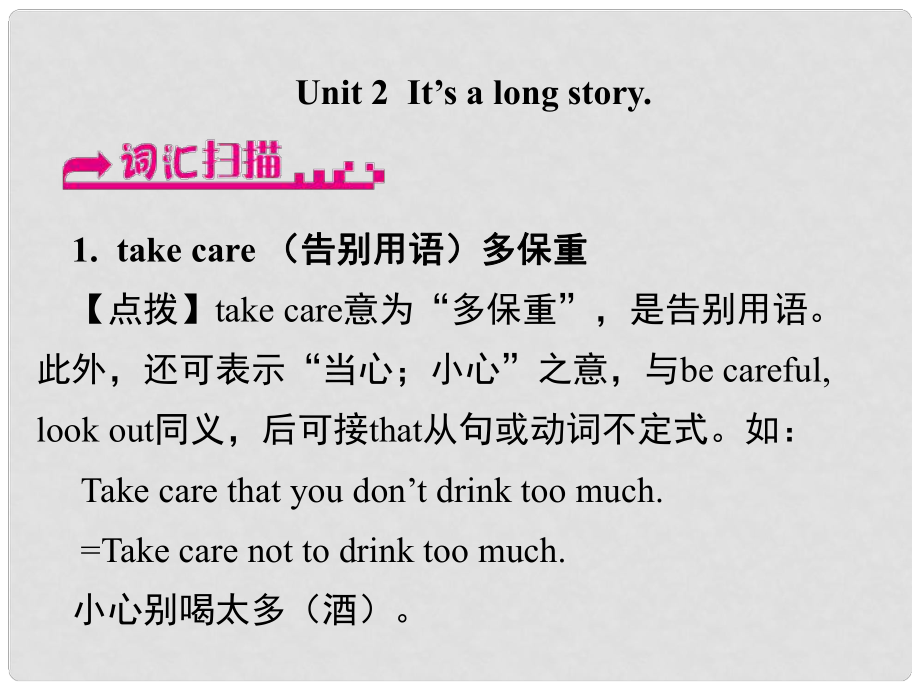《浙江省嘉興市秀洲區(qū)九年級英語下冊 Module 1 Unit 2 It’s a long story課件 (新版)外研版》由會員分享��,可在線閱讀����,更多相關《浙江省嘉興市秀洲區(qū)九年級英語下冊 Module 1 Unit 2 It’s a long story課件 (新版)外研版(18頁珍藏版)》請在裝配圖網(wǎng)上搜索�����。
1����、Unit 2 Its a long story. 1. take care (告別用語)多保重(告別用語)多保重 【點撥】take care意為“多保重”,是告別用語��。此外����,還可表示“當心;小心”之意����,與be careful, look out同義,后可接that從句或動詞不定式����。如: Take care that you dont drink too much. =Take care not to drink too much. 小心別喝太多(酒)�。2. elderly adj. 上了年紀的�;較老的上了年紀的;較老的 【點撥】elderly是形容詞���,意為“上了年紀的�;較老的”���。如: The
2�、elderly man looks for his ticket in his pocket, his bag and finally finds it in his wallet. 這個老人在他的口袋���、包里尋找車票��,最終在錢包里找到了票��。 【辨析】elder, older與elderly elder, older這兩個詞均是old的比較級�,elder本身也是形容詞��,三個詞在用法上有所區(qū)別���。 (1)elder意為“前輩的���;年紀較長的”����,僅用于同一家庭成員的比較����;older則不限于此�����。如: My younger son is five and my elder son is nine. 我的小兒
3����、子五歲,大兒子九歲��。 Tom is two years older than I. 湯姆比我年長兩歲��。 (2)elder在句中只用作定語���,不作表語���;older則兩者皆可。如: His elder son got married last week. 他的長子上星期結婚了。 I think his mother is older. 我認為他的母親年齡大一些�。 (3)elder只能用來指人;older既可指人��,也可指物��,older指物時意為“較舊的”��。如: My elder brother joined the army when he was only fifteen. 我哥哥年僅15歲就參了軍
4�、。 This bike is older than that one. 這輛自行車比那輛舊����。 (4)elderly是委婉用語,一般不說old man����,而用elderly man代替。the elderly泛指“老人”����。如: His mothers elder sister is an elderly woman. 他媽媽的姐姐是一個老婦人。3. ready adj. 準備好的準備好的 【點撥】(1)ready最常用的是作形容詞��,其含義及用法如下: 1)意為“準備好的”����,不用在名詞前面作定語����,僅作表語�。如: I will be ready in five minutes. 我將在五分鐘之內(nèi)準備好
5、��。 Are you ready to go to school? 你準備好去學校了嗎��? 2)意為“甘愿的���;樂意的”,不用在名詞前面作定語����,僅作表語。如: She is always ready to help. 她總是很樂意幫忙�。 They werent ready to lend me the money. 他們不愿意借給我那筆錢。 3)意為“迅速的��;敏捷的�;靈巧的”,用在名詞前作定語�。如: She has got a ready mind. 她思維敏捷�����。 He has a ready pen. 他文筆敏捷�����。 (2)含ready的常用搭配: be ready to do sth. 準備好做某
6��、事 be ready for sth. 準備好某事����;急于行動 be ready with sth. 愿意做某事 get ready for sth. 準備做某事�����;為做某事而準備 get sb. ready 使某人準備好 have sth. ready 準備好某物4. take off 脫下脫下 【點撥】take off意為“脫下”�,其反義短語是put on,意為“穿上”���。如: Please take off your shoes before going into the house. 請你在進屋之前脫掉你的鞋����。 Its warm here. You may take off your coa
7��、t. 這里很暖和,你可以把外套脫了���。 【延伸】take off還可以表示“起飛”�,其反義詞是land(降落)�。如: The plane took off half an hour ago. 飛機在半小時前起飛了。 1. Im afraid youre sitting in my seat. 恐怕你坐在了我的位置上��?�?峙履阕诹宋业奈恢蒙?���。 【點撥】(1)Im afraid (that).意為“恐怕”,用來有禮貌地表達可能令人不快的信息�。 (2)afraid常用于以下結構中: be afraid to do sth.=be afraid of doing sth. 害怕做某事���;害怕某事會發(fā)生 I
8�����、m afraid so. 恐怕是這樣�。 Im afraid not. 恐怕不是這樣����。 2. Li Lin and Li Wei are on the station platform, saying goodbye to each other. 李林和李偉在車站的站臺上����,相互道別�����。李林和李偉在車站的站臺上����,相互道別。 【點撥】此句中的saying goodbye to each other在句中屬于現(xiàn)在分詞作伴隨狀語�����。伴隨狀語是指狀語從句的動作伴隨主句發(fā)生��,它的特點是:它所表達的動作或狀態(tài)是伴隨著句子謂語動詞的動作而發(fā)生或存在的�。如: He sat in the armchair, readi
9、ng a newspaper. 他坐在扶手椅里讀報���。 All night long he lay awake, thinking of the problem. 他整夜躺在床上睡不著���,思考著那個問題��。 【延伸】伴隨狀語的其他表示方法: (1)用with復合結構���。如: The little girls were playing with snow with their hands frozen red. 小女孩們在玩雪,手都凍紅了�����。 (2)用獨立主格結構��。如: The little boy goes to school, the little dog accompanying him every day. 這小男孩每天去上學,那條小狗都陪伴著他�。 (3)用形容詞�。如: Crusoe went home, full of fear. 克魯索滿懷恐懼地回家���。(4)用介詞短語。如: The girl came back to her mother in tears. 這女孩眼淚汪汪地回到她母親身邊����。
 浙江省嘉興市秀洲區(qū)九年級英語下冊 Module 1 Unit 2 It’s a long story課件 (新版)外研版
浙江省嘉興市秀洲區(qū)九年級英語下冊 Module 1 Unit 2 It’s a long story課件 (新版)外研版

